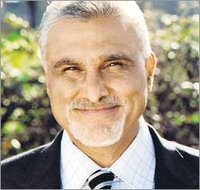
By Gayatri Jayaraman - Daily News & Analysis - Mumbai,India
Saturday, July 8, 2006
MUMBAI: The Corporate Sufi is distinctly uncomfortable in, and slightly surprised to find, the Americanised coffee shop in suburban Mumbai. “But hey," he shrugs at the 20 somethings with laptops and ipods around, “If they're happy, then that's good. If they're not, then they'll come to me.”
One suspects he hides a knowledge that come his way they will. After all, Azim Jamal, author of 7 Steps to Lasting Happiness, the Corporate Sufi and the One Minute Sufi, himself was once there—he chucked up his successful financial wizardry to volunteer at public speaking in Afghanistan, where 14 children in a hut changed his life's mission forever. He now spends his life translating Sufi tenets to the language of everyday living, constantly showing with examples from his own life, that this is indeed possible.
Jamal's keen eyes (awake since 4 am, he tells you) are moving on to other things. He has conferences to speak at, corporates to motivate, and individual potentials to actualise, and as he explains his commitments, he's gauging the potential in those around him. “Learn from every experience and every encounter,” says the Sufi, and Jamal does.
But the ‘corporate’ takes it all away from religion and spirituality. “When you talk about religion, people may glaze over, about spirituality and some think it's mumbo jumbo, but when you tell the most hardened sceptic it’s about you, about finding your place in the world and pushing your own potential—I believe most people work at 80 per cent potential underutilised— then everyone wants a piece of it,” he says.
“Look at it as problem-solving—in life, at work, in relationships. That’s all this really is." But isn't religion and spirituality a tad difficult to sell in a society growing increasingly sceptical of religion? “Post 9-11, society has become increasingly suspicious of religious intentions, but that's just terminology and branding beyond a point, it’s about finding a balance and finding one's inner potential," he says.
And is it up to the Deepak Chopras, Robin Sharmas and Azim Jamals of the world to tell you where it lies?
“Indian philosophy and tradition roots us best in the ability to find that balance. That's why contemporary Indian thought is so crucial to showing the way,” Jamal says.








No comments:
Post a Comment